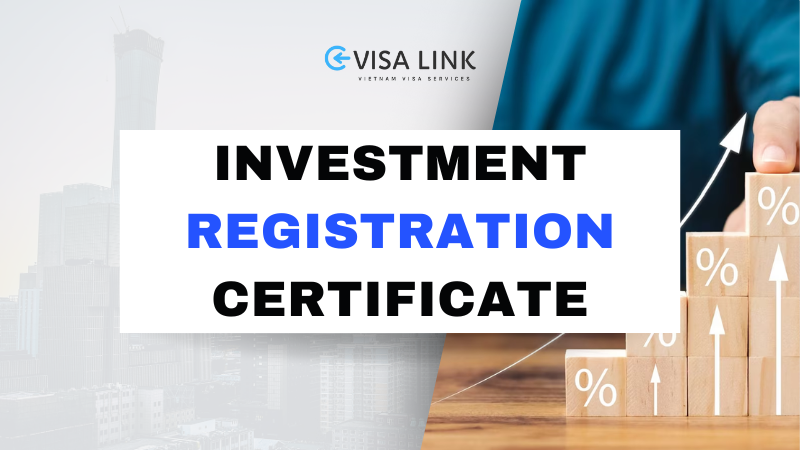Complete Guide to Vietnam’s Investment Registration Certificate (IRC)
Investment registration certificate Vietnam is a pivotal credential for international investors keen on tapping into the vast potential of Vietnam’s market. This guide serves as your compass, elucidating the complexities surrounding the acquisition of this essential certificate. With an in-depth look into its importance, step-by-step application process, and critical prerequisites, we aim to empower foreign investors with the knowledge needed to navigate and succeed in Vietnam’s vibrant economic environment.
Introduction to Investment Registration Certificate Vietnam
The Investment Registration Certificate Vietnam holds immense significance for investors, whether local or foreign, aiming to establish their foothold in Vietnam. This comprehensive guide is your gateway to gaining a profound comprehension of the procedures required to acquire an investment registration certificate Vietnam. Discover the essential steps and crucial insights to navigate this pivotal aspect of the Vietnamese business landscape effectively.
The significance of the Vietnam Investment Registration Certificate
Before delving into the intricacies of the process, it’s essential to understand why the Investment Registration Certificate Vietnam is of paramount importance:
- Legal Necessity: The investment registration certificate Vietnam is a legal prerequisite for foreign investors, ensuring their adherence to Vietnamese laws and regulations.
- Streamlined Business Operations: The investment registration certificate Vietnam is a crucial document that grants foreign investors the authority to participate in business activities within designated sectors in Vietnam, simplifying and facilitating their business operations in the country.
- Protection of Investor Rights: The investment registration certificate Vietnam functions as a protective shield for investors, ensuring the safeguarding of their rights and interests in strict adherence to Vietnamese laws and regulations.
Step-by-Step guide to obtaining an Investment Registration Certificate
Steps to register a company in Vietnam means Sep up a company in Vietnam or Establish a company in Vietnam
- Apply for the Investment Registration Certificate;
- Apply for the Enterprise Registration Certificate;
- Apply for other licenses such as Business License for the companies which retail directly to customers or specialized licenses to meet the requirements of some conditional business lines such as Training, Travel, Legal, Healthcare,…
Step 1: Register the Investment Registration Certificate
The process of obtaining an investment registration certificate Vietnam involves several authorities responsible for issuance and regulation. Here are the key entities involved:
Management Boards of Specific Zones:
- Industrial parks, export-processing zones, hi-tech zones, and economic zones are managed by their respective Management Boards.
- These boards handle the issuance, adjustment, and revocation of the irc investment registration certificate Vietnam for projects situated within these zones.
Services of Planning and Investment:
- For investment projects located outside the aforementioned zones, the Services of Planning and Investment come into play.
- They are responsible for receiving, issuing, adjusting, and revoking investment registration certificates.
Exceptions:
- When an investment project extends across multiple provinces in Vietnam, the management of the investment registration falls under the purview of the Service of Planning and Investment in the province where the investor plans to establish the head office or operating office. This process ensures compliance with the necessary investment registration certificate Vietnam requirements and regulations.
- Moreover, when it comes to investment projects conducted within and beyond the designated zones in Vietnam, the registration process is overseen by the respective Service of Planning and Investment, ensuring compliance with the requirements for obtaining an Investment Registration Certificate Vietnam.
Understanding the authority distribution for investment registration in Vietnam is crucial for investors looking to navigate the initial steps in establishing their ventures effectively.
- The documents required for applying for the investment registration certificate Vietnam encompass a comprehensive dossier. This includes:
- A formal request seeking permission to execute the investment project.
- A copy of the ID card or passport (for individual investors) or a copy of the Certificate of establishment or an equivalent document verifying the legal status of the investor (for organizations).
- An investment proposal detailing critical aspects like the project’s investors, objectives, scale, capital, funding methods, location, duration, labor requirements, incentive requests, and an assessment of its socio-economic impact.
- Copies of specific documents such as the investor’s financial statements for the past two years, commitments from the parent company or financial institutions to provide support, guarantees for the investor’s financial capacity, and descriptions of the investor’s financial capability.
- An office lease agreement and documentation validating the lessor’s rights, including the Certificate of land use right, construction permit, or a business registration certificate with real estate business functions (or equivalent documents).
- Documentation demonstrating land use demand. If the project doesn’t use state-allocated or leased land or hasn’t been permitted by the State to change land purposes, a copy of the lease agreement or other documents affirming the investor’s right to use the premises for project execution is required.
- A detailed explanation of the technologies applied in the project, especially if they are on the list of technologies restricted from transfer under technology transfer laws. This should include technology names, origins, process diagrams, primary specifications, machinery and equipment requirements, and the primary technological line.
- The business cooperation contract (if the project operates under such an agreement).
Step 2: Register the Enterprise Registration Certificate
The process and documentation required for company registration are identical for both local companies with Vietnamese capital and those involving foreign investors seeking an investment registration certificate Vietnam. The requisite dossier consists of the following:
- An application form for business registration.
- The company’s charter.
- A member list (for limited companies) or stakeholder list (for joint-stock companies).
- Certified copies of the following documents:
- Copies of the ID card or other identification papers of individual members.
- Decision on Establishment, Business Registration Certificate, or equivalent documentation of the organization along with a letter of authorization.
- The ID card or other identification papers of authorized representatives of organizational members. For foreign organizations, a copy of the Certificate of Business Registration or equivalent documentation must undergo consular legalization.
- The Investment Registration Certificate Vietnam of the foreign investors as prescribed by the Law on Investment.
- A Power of Attorney (Authorization contract) to empower Viet An Law Firm to carry out the business establishment service.
To initiate the process, you should submit the application dossier to the Enterprise Registration Authority via the National Enterprise Registration Portal within a timeframe of 3 to 5 days. Following the submission, the business registration agency will issue an Enterprise Registration Certificate. Subsequently, upon obtaining the Enterprise Registration Certificate, you are required to make a public announcement on the National Enterprise Registration Portal in accordance with the prescribed order and procedures, typically within 30 days from the date of publication.
Step 3: Register the Business License for conditional business lines
- For various conditional business investments in Vietnam, it’s essential to understand the requirements and procedures involved, particularly when it comes to obtaining the Investment Registration Certificate. However, it’s worth noting that, in addition to the Investment Registration Certificate, certain businesses may require a separate business license. This separate business license holds legal validity independently, distinct from the Enterprise Registration Certificate.
Let’s delve into a few examples:
According to Decree 09/2018/ NĐ-CP, which regulates goods trading and related activities involving foreign investors and organizations with foreign investment in Vietnam, retailing involves selling goods to individuals, households, and organizations for consumption. In this context, investors typically don’t need a separate business license for exporting, importing, or wholesaling goods unless the goods fall into specific categories (such as oil, lubricants, rice, sugar, video items, books, newspapers, and magazines). However, a business license is required when engaging in the retail sale of goods or establishing retail establishments.
- International Travel Business (Inbound): Foreign investors interested in conducting international travel business focused on bringing foreign tourists to Vietnam need to adhere to specific regulations.
- Business Training in Foreign Languages: Investors planning to operate a business that provides training in foreign languages must obtain approval from the Department of Education and Training during the Investment Registration Certificate Vietnam issuance process. Furthermore, before commencing operations, the enterprise must register for a License to operate a foreign language training center with the Department of Education and Training.
Legal insights and considerations
To navigate the legal landscape concerning the Investment Registration Certificate Vietnam, it’s crucial to delve into the following key considerations:
- Types of Investments: Gain insights into the diverse forms of investments, including foreign direct investment (FDI) and domestic investment, to determine the most suitable approach for your business.
- Conditional Business Sectors: Explore sectors that come with specific conditions and requirements for foreign investors. Understanding these conditions is vital for a smooth investment process.
- Taxation and Incentives: Delve into the tax implications of your investment and discover the incentives offered by Vietnam to encourage foreign investment. These insights can significantly impact your investment decisions and financial planning.
Conclusion
In conclusion, obtaining an investment registration certificate Vietnam is a critical step for investors looking to operate within the country. This comprehensive guide has walked you through the process, legal considerations, and provided practical insights to help you navigate this journey successfully. Remember that legal requirements and regulations may change, so it’s advisable to consult with legal experts or local authorities for the most up-to-date information on obtaining your investment registration certificate Vietnam. For further assistance or inquiries, feel free to reach out to [Your Company Name], a trusted partner in establishing foreign investments in Vietnam.


